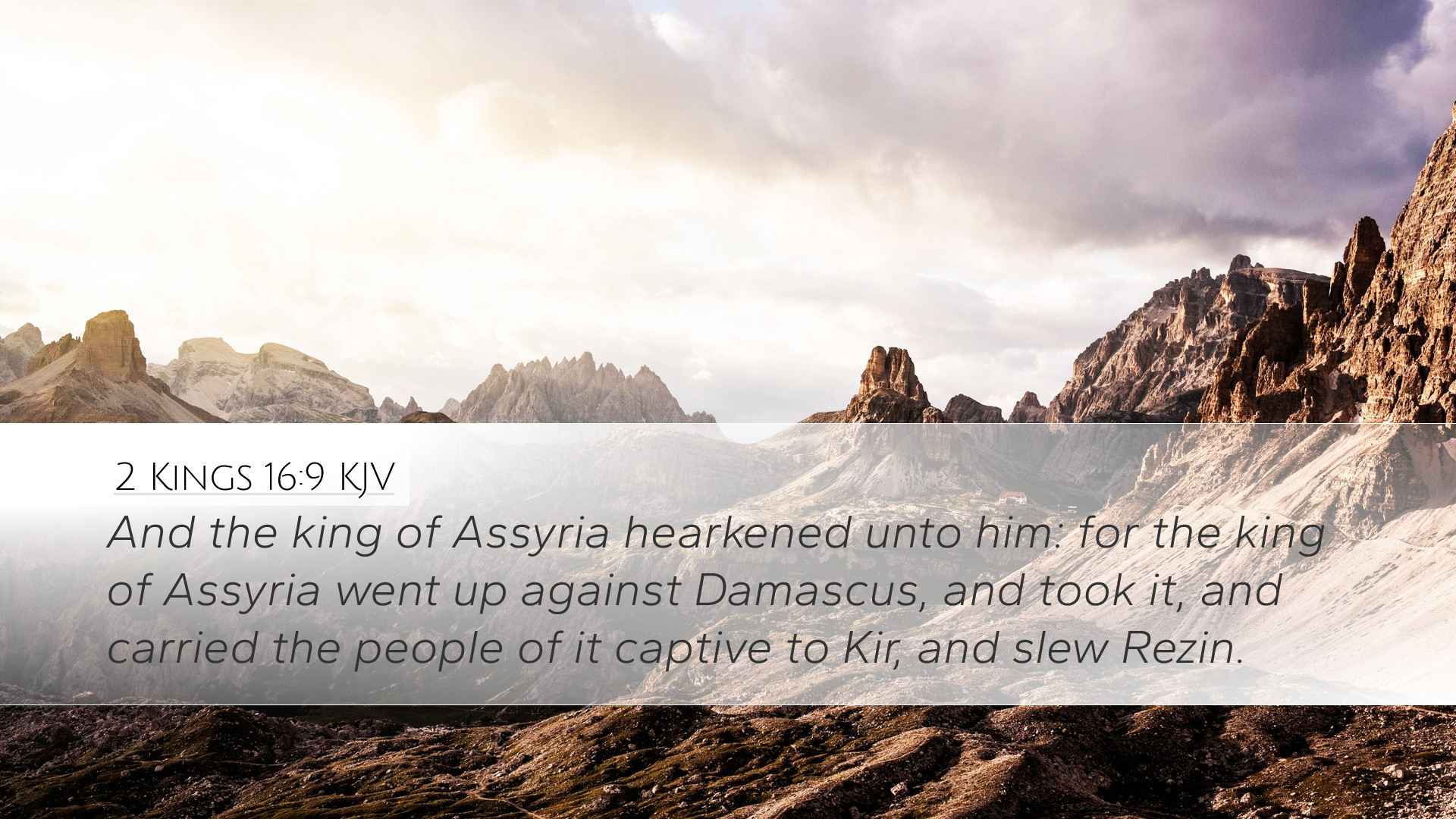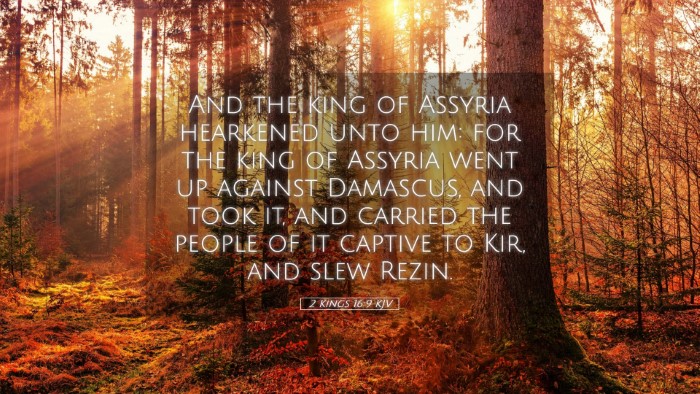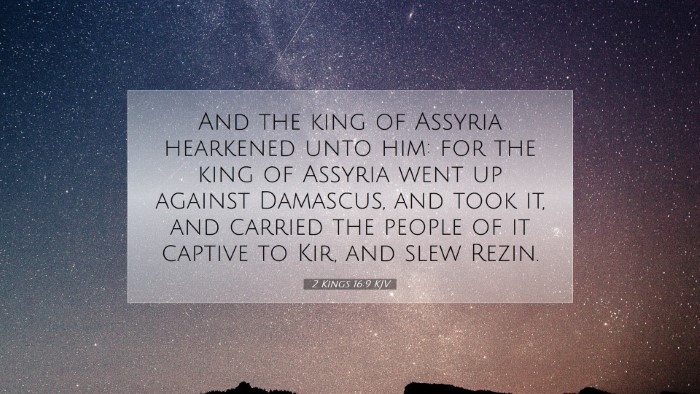Old Testament
Genesis Exodus Leviticus Numbers Deuteronomy Joshua Judges Ruth 1 Samuel 2 Samuel 1 Kings 2 Kings 1 Chronicles 2 Chronicles Ezra Nehemiah Esther Job Psalms Proverbs Ecclesiastes Song of Solomon Isaiah Jeremiah Lamentations Ezekiel Daniel Hosea Joel Amos Obadiah Jonah Micah Nahum Habakkuk Zephaniah Haggai Zechariah Malachi2 Kings 16:9
2 Kings 16:9 KJV
And the king of Assyria hearkened unto him: for the king of Assyria went up against Damascus, and took it, and carried the people of it captive to Kir, and slew Rezin.
2 Kings 16:9 Bible Commentary
Commentary on 2 Kings 16:9
Verse Text: "And the king of Assyria hearkened unto him: for the king of Assyria went up against Damascus, and took it, and carried the people of it captive to Kir, and slew Rezin."
General Context
This verse is situated within a turbulent historical narrative concerning the kingdom of Judah during the reign of King Ahaz. It highlights the political maneuvers and alliances that characterize the period, particularly the interactions between the kingdoms of Judah, Israel, and Assyria.
Political Significance
The actions of the Assyrian king in responding to Ahaz's overtures reveal the geopolitical dynamics of the time. Ahaz, facing threats from Rezin of Damascus and Pekah of the northern kingdom of Israel, sought assistance from Assyria, indicating a reliance on foreign powers rather than faith in God.
- Alliance with Assyria: Ahaz's choice to ally with Assyria represents a significant turning point for Judah, as it involved compromising religious convictions and aligning with a pagan power.
- Demise of Damascus: The destruction of Damascus and the captivity of its inhabitants signifies the decline of Israel's influence and the rise of Assyrian power in the region.
Commentary Insights
Various commentators offer detailed insights into the significance of this verse and the broader implications for the narrative of Judah's kings:
Matthew Henry's Commentary
Henry emphasizes that the king of Assyria's actions demonstrate God's sovereignty over the nations. Though Ahaz seeks aid from a foreign ruler, God orchestrates events to fulfill His purposes. Henry sees in this the futility of turning to worldly powers for help, warning believers today against placing their trust solely in human alliances.
Albert Barnes' Notes
Barnes notes the prophetic fulfillment found in this passage, reminding readers that God's judgment against Damascus was foretold. The removal of Rezin and the deportation of his people aligns with God's plans for the region, highlighting His control over history. Barnes illuminates the ways Ahaz's choices lead to dire consequences, both politically and spiritually.
Adam Clarke's Commentary
Clarke provides a contextual analysis of the nations involved. He draws attention to the fierce power of Assyria and its kings, noting that the fall of greater cities reminds readers of the volatility of human pride and power. Clarke elaborates on the implications of Rezin's death for the people of Israel, suggesting that their trust in a military alliance ultimately led to their downfall.
Theological Reflections
2 Kings 16:9 carries profound theological implications for understanding human agency, divine sovereignty, and the consequences of sin:
- Human Agency: The political decisions of Ahaz illustrate the complexities of leadership and the consequences of relying on human wisdom rather than divine guidance.
- Divine Sovereignty: The Assyrian conquest serves as a reminder that God is ultimately in control, using both the righteous and wicked to accomplish His purposes.
- Consequences of Sin: Ahaz's actions lead to long-term consequences for Judah, demonstrating the interconnectedness of moral choices and national fate.
Application for Today
For contemporary readers, this passage invites reflection on the following:
- Trust in God: Just as Ahaz sought assistance from human nations, modern believers must evaluate where they place their trust in times of trouble.
- Lessons from History: Understanding biblical history allows pastors and students to draw parallels between ancient and modern political and spiritual dilemmas.
- Seeking Godly Counsel: In leadership and personal decisions, it is essential to seek divine wisdom and guidance over worldly strategies.
Conclusion
2 Kings 16:9 serves as a critical reminder of the intersection between faith and politics, sovereignty and human effort. As the narrative unfolds, it compels the reader to examine their allegiances and the overarching narrative of God's redemptive work through history. The insights gleaned from public domain commentaries deepen our understanding of this pivotal moment and its relevance to our lives today.


